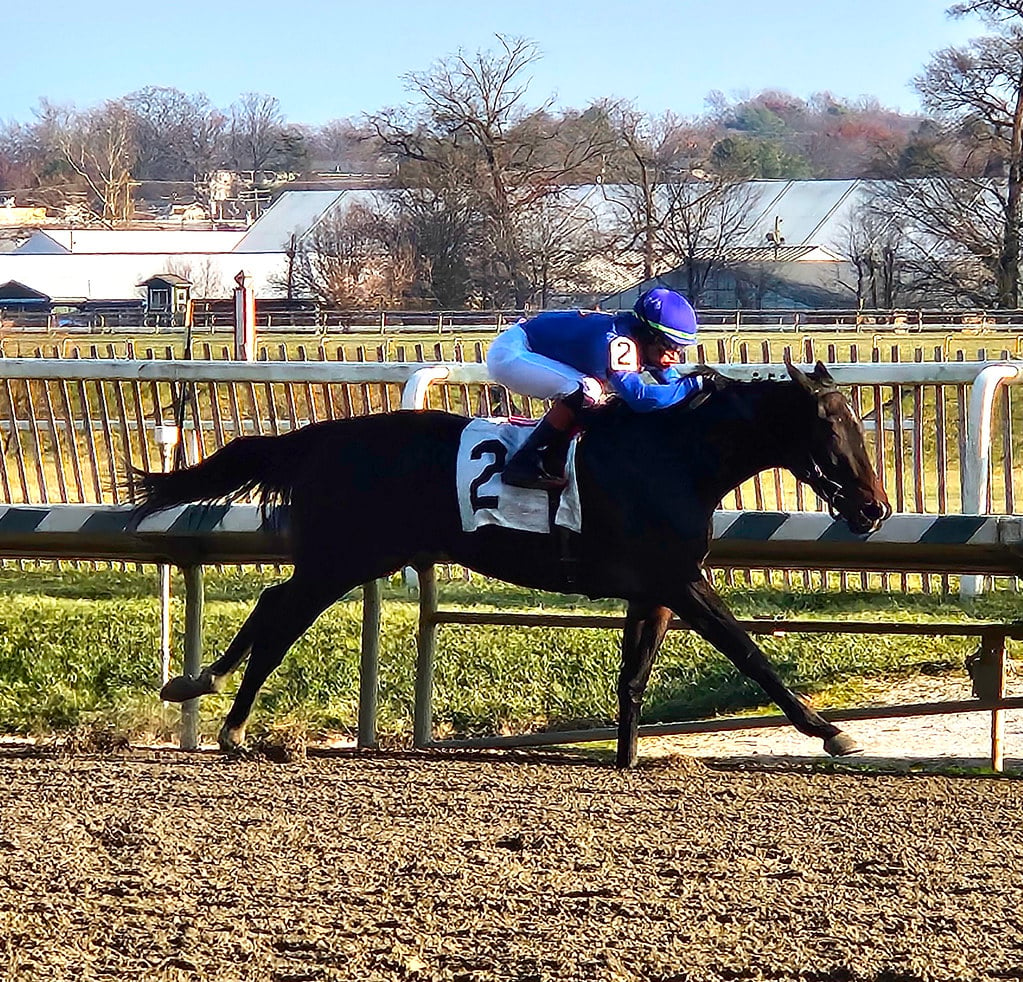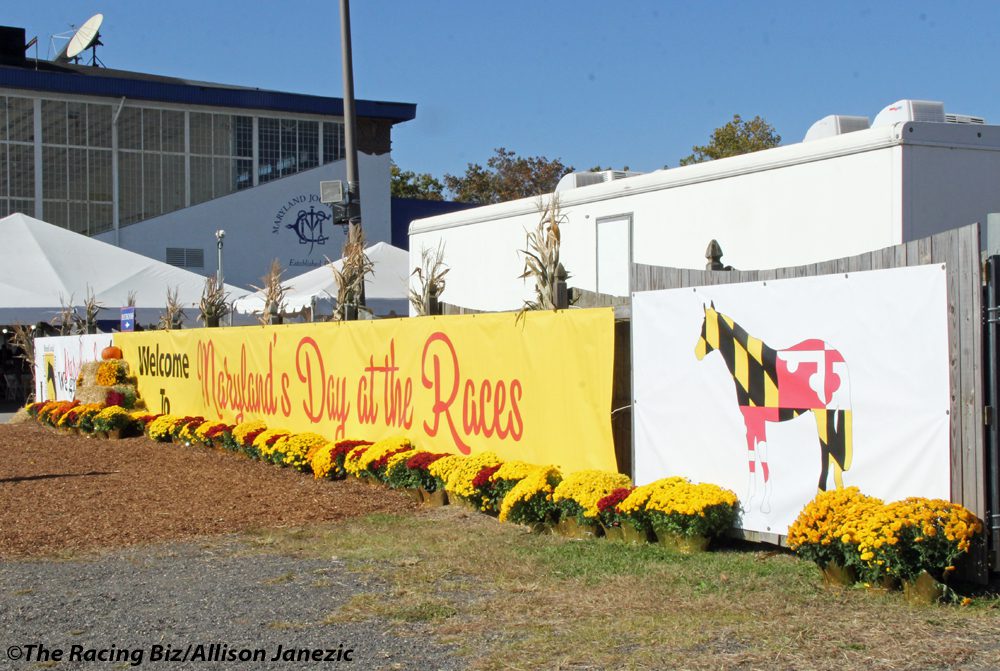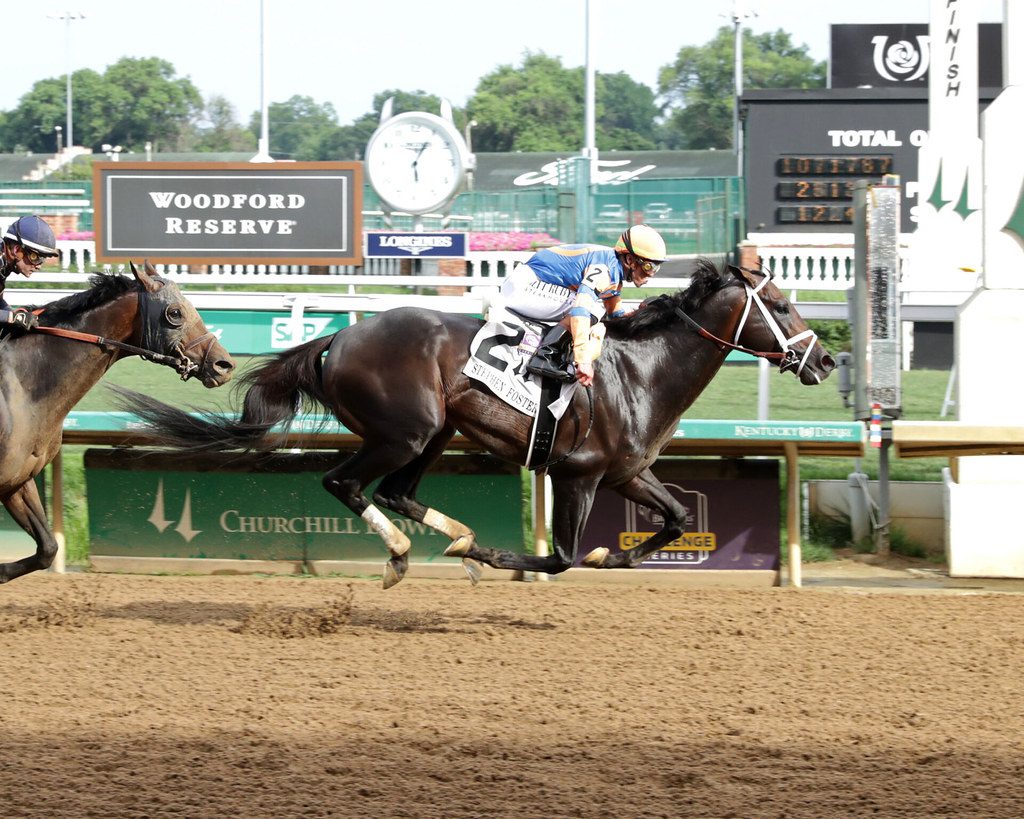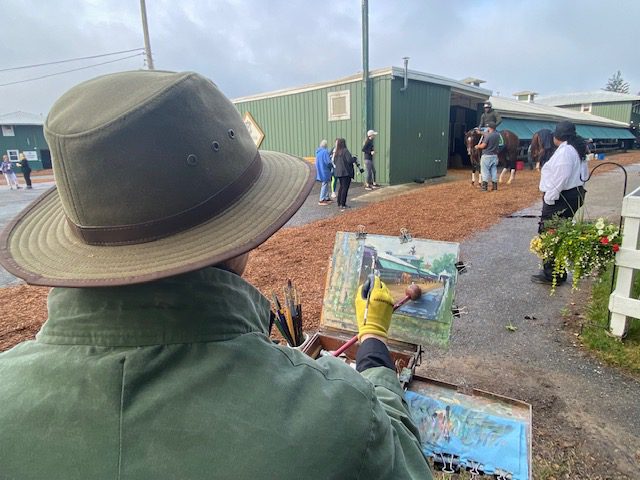(Photo by The Racing Biz.)
by Frank Vespe
She’s Hot Wired and Dreamboat Annie ran one-two in a first level allowance at Laurel Park on February 15 — the last day of live racing in Maryland before the hiatus that will end tomorrow.
Remarkably, just a few months earlier, neither the winner nor the runner-up would have been permitted to enter the race.
She’s Hot Wired had already won an allowance race. And Dreamboat Annie had won not only an allowance but also a stakes race while earning more than $140,000 in nine races.
What gives? How could horses with such resumes enter a race known in the parlance as an “a-other-than,” meaning for horses that haven’t won other than in maiden, claiming, or starter company?
The answer: Those prior allowance and stakes wins had come against state-bred company: New Jersey-bred in She’s Hot Wired’s case and New York-bred in Dreamboat Annie’s.
Winners of state-bred allowances and stakes taking first level allowance races at Laurel Park are a picture that’s been increasingly common since the Maryland Jockey Club (MJC) modified its allowance conditions in late 2015 to exclude state-bred and state-sired wins from consideration.
And that points to the necessary next step in the revitalization of the Maryland breeding industry. It’s time for restricted, Maryland-bred allowance races.
From an MJC perspective, the modification of the allowance conditions makes good sense. It makes more horses eligible for the condition, which means more horses entered, and more horses entered means more betting. That’s good for business.
And for some horsemen — who own or train horses bred in other nearby states — it’s a real boon: an opportunity for another good payday in a sport where making money is hard enough as it is.
There’s only one problem: it handicaps Maryland-breds, who have virtually no state-bred allowance races to bolster their earnings and who also now must face the tougher fields created by allowing more accomplished runners to enter local allowance contests.
It’s quite literally providing an advantage to horses bred outside of Maryland.
That needs to change — and not just for the health of the breeding industry.
For one thing, the state Racing Commission has in recent years been quite assertive about its interest in promoting the Maryland breeding industry. Yet having bonuses for Maryland-breds while at the same time providing advantages to horses bred in other states — when those same advantages are not available to Maryland-breds — means that different facets of the industry are working at cross purposes; leveling the playing field by adding a Maryland-bred allowance would bring those facets back in concert.
For another, keeping Maryland horses home is essential to ensuring the sizable horse population the track needs. As purses have risen, and then bonuses were instituted, the percentage of starts made in Maryland by Maryland-breds has doubled, according to the Jockey Club — that’s good for the industry. Adding a Maryland-bred allowance would be another inducement to bring Maryland horses home.
From a political perspective, the wisdom of adding a Maryland-bred allowance condition is clear. Maryland racing and breeding benefit substantially from state subsidies from slot machine revenues. As has been made clear — most recently in West Virginia and Florida — that those revenues will come to the Thoroughbred industry is not written in stone; both gaming companies and many state legislators have what they perceive as better uses for this money than subsidizing racing. By spreading the wealth around — so that breeders and horsemen and the racetracks and their employees all benefit — the industry increases its political clout and to a certain extent inoculates itself against political attacks.
Some have argued in the past that there are too few Maryland-breds to hold state-bred races. But the success of last summer’s Maryland Pride Day — and New Jersey’s having a state-bred program with many fewer NJ-breds — suggest that’s not accurate. What’s more, adding simply one condition — a Maryland-bred a-other-than — or even Maryland-bred maiden and a-other-than races is hardly going to overtax the horse population.
And then there’s the question of where the money would come from. The answer is that it ought to come from the purse account. It will be Maryland-based horsemen who benefit most of all from such a change, and a Maryland-bred allowance will actually take less from the purse account than a standard one does, since there will be no state-bred bonuses to pay on it.
Multiple sources have said that productive discussions on this topic are currently taking place. On the other hand, state-bred racing has been a hot-button issue in Maryland for years.
It’s time to resolve this issue. It’s time for a Maryland-bred allowance condition.














Anonymous
10th Mar 20162.5
Anonymous
11th Mar 20165
LP
11th Mar 2016Amen, Frank! I’ve been perplexed as to why some MTHA Board members, some MHBA past and present board members and even some past and present MRC members have fought against state-bred races. Some of these same individuals lobbied heavily against Pride Day ( where the majority of the purse money came from the MHBA). Their main argument was that the races would not fill. Not only did the races fill, the racing office was able to close entries early.
I have a few theories: 1. the MTHA would rather kill racing in Maryland than see people breed horses 2. Some of these people have small hands and therefore this is their outlet to prove virility 3. Their inbreeding coefficient is close to 1 and therefore they do not recognize that it is not 1985 when the majority of horses were foaled in Maryland.
All of these individuals are over 50- must we wait till this generation either dies or leaves the business in order to move into the 21st century?
Anonymous
11th Mar 20161
PHIL SCHOENTHAL
12th Mar 2016Great piece Frank, I wholeheartedly agree.
I don’t really care if they have MD bred races or not, I would like to see them but if they do not they have to take away the “or state bred” qualifier off the nw1x, they can’t have it both ways.
Michael Fisher
14th Mar 2016I am for state-bred races and was told that there were not enough state bred horses.
Phil SCHOENTHAL
17th Mar 2016Latest fairly substantiated rumors around the backside at Laurel from people that would know is that they are going to have 4 MD bred nw1x races in May, boys and girls, long and short all on the turf, which they figure will not cannibalize the nw1x fields otherwise.
Michael Fisher
23rd Mar 2016Fantastic it is about time.
Ed Buxbaum
18th Mar 2016I fully agree with the idea of creating Maryland bred allowance races. That said, the Breeders Association has dropped the Geisha Stakes for this year’s Preakness meet which is a state restricted stakes for fillies and mares that has been run at Pimlico since forever. The Breeders Association can’t have it both ways- if they are trying to promote Maryland racing and the benefits of owning a Maryland bred (as I do) then you cannot further limit the few Md. bred stakes races that are available!
mICHAEL fISHER
23rd Mar 2016i TOTALLY AGREE AND WOULDN’T YOU KNOW IT. i JUST MIGHT HAVE HAD A ENTRY.
Jared g.
18th Mar 2016As long as this doesn’t turn into a situation where the MD-breds never leave home. I think it does a disservice to the horses to not allow them to compete in open company in other states. There is a perception that WV breds compete in a vacuum because they can’t be competitive against horses bred in other states, causing their commercial value to decrease. I don’t believe that to be true of the WV breds and I don’t want to ever see that perception happen with MD breds, just to get an extra condition in the book. This can be done responsibly, as long as all involved don’t become dependent on these races.
Jared G.
18th Mar 2016Let me clarify… No one is stopping WV breds from competing out of state, but the number of restricted races every card at CT causes no one to venture out and prove the self against horses of (supposedly) the same class.
The Biz
19th Mar 2016I agree, and I think everyone does. It’s not about a crutch, it’s about a level playing field, which currently does not exist. Shouldn’t be an issue to create one without creating a whole state-bred program that protects horses from ever running against open company.
Michael Horning
15th Apr 2016The ridiculousness continues! NY Bred allowance and stakes winner Dreamboat Annie (winner of over $150,000 at the time) cruises to an a other than victory at Laurel in the 9th race last Saturday, 4/9 (a six horse field). Look at who is in the 7th race this Sunday, 4/17 at Laurel. Freudie Anne is a two time NY Bred allowance and two time NY Bred stakes winner with earnings of over $262,000 and is running in this a other than race (an 8 horse field). The increased field size argument for exempting state bred races is obviously misguided. How is this good for Maryland racing? Carding 4 MD Bred races at Pimlico with reduced purses ($35,000 for AOT vs, $42,000 – and who thought that up?) is not the answer. Using that logic, maybe an out of state horse that has won a state bred allowance or stake and is running in an AOT here should be running for $35,000 instead of $42,000 and would receive a reduced purse so things are equitable. This obvious inequity and prejudice against MD breds needs to be addressed – and sooner rather than later.